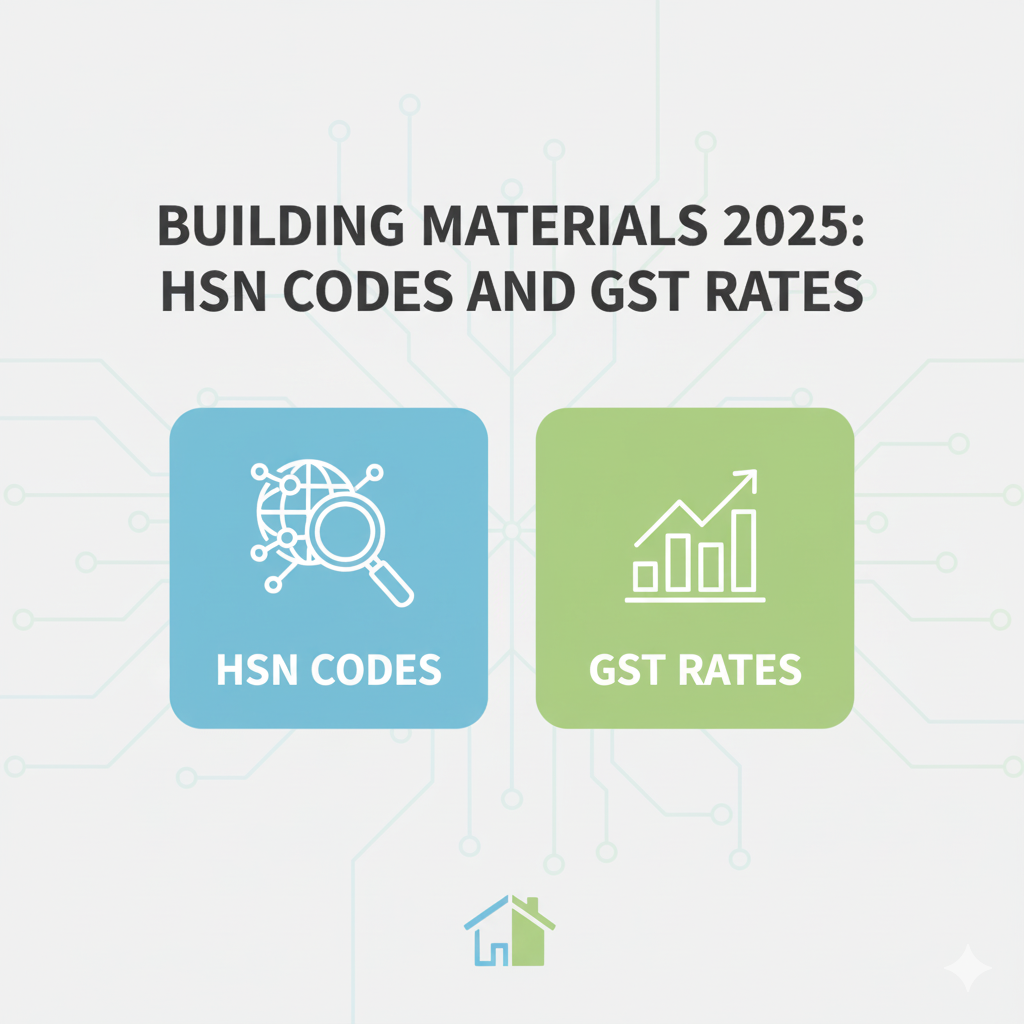Building Materials HSN Code & GST Rates in India 2025
Are you a builder, contractor, or retailer in the construction industry? Understanding the HSN code for building materials and their corresponding GST rates is crucial for tax compliance, accurate invoicing, and smooth business operations. For building materials, the HSN Code classifies each product type (like cement, bricks, steel) and GST is charged according to these codes to maintain uniform tax rates across India.
In this comprehensive guide, we’ll cover the latest HSN codes and GST rates for cement, steel, bricks, tiles, pipes, and other construction materials as per the GST 2.0 reforms effective from 2025.
What is an HSN Code and Why It Matters?
HSN (Harmonized System of Nomenclature) code is an internationally recognized system for classifying goods.
Benefits for construction businesses:
-
Correct GST application on building materials.
-
Accurate invoicing for clients and contractors.
-
Avoiding penalties during GST audits.
-
Improved inventory and procurement planning.
“In addition, using the correct HSN Code for building materials ensures you apply the right GST rate on every invoice. Therefore, your business stays compliant and avoids unnecessary penalties.”
Why Builders and Retailers Should Track HSN Codes
-
Tax Compliance – Ensures GST is charged correctly.
-
Professional Invoicing – Helps in clear billing and client transparency.
-
Audit Readiness – Maintains proper records for GST audits.
-
Inventory Management – Helps in planning procurement and tracking material usage.
Tips to Use HSN Codes Effectively
-
Always verify HSN codes with your suppliers.
-
Update your accounting and billing software regularly.
-
Train your team on HSN code usage.
-
Consult a tax professional for complex material classifications.
Using the correct HSN Codes for building materials is essential for every construction business. For instance, applying the wrong code can lead to incorrect GST charges, which might result in penalties. Moreover, it streamlines your accounting process and, at the same time, ensures transparency with suppliers. Therefore, keeping a checklist of frequently used HSN Codes is highly recommended. In addition, businesses that regularly update themselves on GST changes can avoid compliance issues. As a result, your operations become more efficient, and you gain better control over financial reporting.
HSN Code for Building Materials: How GST Rates Apply in India (2025)
In addition here is a quick reference table of HSN codes and GST rates for commonly used building materials:
| Material | HSN Code | GST % |
| Cement (all types) | 2523 | 18% |
| Steel (TMT bars, rods) | 7214 | 18% |
| Bricks (fly ash, clay) | 6901 / 6815 | 5% |
| Sand (natural or manufactured) | 2505 | 5% |
| Tiles (ceramic, vitrified) | 6907 | 18% |
| Paints & Coatings | 3208 | 18% |
| PVC / CPVC Pipes | 3917 | 18% |
| Sanitary-ware | 6910 | 18% |
| Glass Sheets | 7004 | 18% |
| Wood & Plywood | 4401 | 5% |
| Crushed Stones, Gravel | 2517 | 5% |
| Electrical Wires & Switches | 8536 | 18% |
“In conclusion, by carefully checking the above HSN Codes and GST rates for building materials, you can ensure accurate billing and smooth tax filing. In addition, this information helps you compare products more easily and, as a result, make better purchasing decisions. Furthermore, understanding these codes builds transparency with your suppliers and, therefore, strengthens your business compliance. Ultimately, by using the right HSN Code and GST rate, you can save time, reduce errors, and improve overall efficiency in your construction projects.”
For Further Clarification visit the official website of CBIC-GST.
To buy Plumbing and Electrical items at best prices please visit bricbay.com


